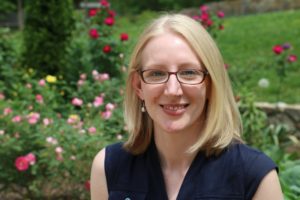 Dayna Olson-Getty serves as associate pastor at Community Mennonite Church in Harrisonburg, Virginia, where she lives with her husband and one living son. She was first called into the Anabaptist stream through Pasadena Mennonite Church and through her studies at Fuller Theological Seminary, where she earned an M.Div. She blogs at daynasmusings.blogspot.com/ and is writing a book about motherhood, grief and faith.
Dayna Olson-Getty serves as associate pastor at Community Mennonite Church in Harrisonburg, Virginia, where she lives with her husband and one living son. She was first called into the Anabaptist stream through Pasadena Mennonite Church and through her studies at Fuller Theological Seminary, where she earned an M.Div. She blogs at daynasmusings.blogspot.com/ and is writing a book about motherhood, grief and faith.
On my third Sunday visiting Durham Mennonite Church, Pastor Spencer Bradford leaned into our getting-to-know-each-other conversation with a warm smile and asked, “So — when would you like to preach?”
Some newcomers might have been scared off by that invitation, but I was elated. As a new seminary graduate who had just moved 2,500 miles from the only Mennonite congregation I had ever known, I was eager to find a church in my new city that would nurture my calling to congregational leadership.
Durham Mennonite did just that. Over the next eight years, I preached, led Bible studies, planned worship services, mentored Anabaptist seminarians and served as a church elder.
But the greatest gift of my new congregation came from being welcomed into the life of a community that allowed all of its members to lead.
Durham Mennonite is an improbably eclectic congregation. Some members grew up in historic Mennonite settlements, while others are descended from enslaved African Americans or from white Baptist preachers. Members reflect theological influences ranging from James Dobson to James Cone and political practices ranging from non-involvement to civil disobedience. Musical offerings on any given Sunday might include an exquisite classical piano solo, a cappella hymns, or a worship chorus accompanied by teenage musicians on electric guitars and drums.
During my years at Durham Mennonite, a significant number of people in our congregation were living with a debilitating mental illness or a cognitive disability. And a significant number of us worked or studied at one of the area’s elite universities. Some among us were unable to read or write, while others read and wrote for a living. Some of us relied on the assistance of others to carry out daily activities, while others were elbow deep in the hard work of daily care for children and elders. And some of us eked out a tenuous survival on disability benefits, while others brought home ample paychecks and health benefits.
Our life together reflected this diversity of bodily experiences. Sometimes our Sunday morning singing was pierced by a cry of wordless pain or joy. Sometimes an astute sermon was punctuated mid-sentence by unexpected commentary from someone in the pews. Our Bible studies revisited again and again the question of how faith might tether us to God’s love during the high winds of delusions or despair. Communal prayer sometimes turned to gut-wrenching lament over the agony of family abandonment or the loss of agency over one’s own life.
 As often is true in small churches, we each contributed all that we were able to our life together, even when our offerings were small or imperfect.
As often is true in small churches, we each contributed all that we were able to our life together, even when our offerings were small or imperfect.
Our congregation’s need for every member’s efforts meant that there was no lack of opportunity to lead and no leadership roles reserved only for those who fit the traditional age, gender, family background or educational criteria.
That such restrictions on leadership roles might exist among Mennonites, even in unspoken form, would have come as a disheartening shock to many of us.
Brothers and sisters in Christ who might have been sidelined in a larger or more polished congregation were instead invited to bring their whole selves to our congregation’s life. Over time, the gifts and longings of the most vulnerable among us became woven into the heart of our life together, creating a safe and tender space for all of us to be honest, genuine, and vulnerable.
Three years into our life with Durham Mennonite, my family was split wide open by grief and vulnerability of our own. Twenty weeks into my first pregnancy, my husband and I learned that the child we were expecting had a birth defect that would destroy his brain and take his life, if not before birth then shortly after. Not long afterward, my family faced a life-and-death struggle with a mental illness. It was then that I felt the full grace of belonging to, and being led by, this improbably varied community of God’s people.
As I wept through week after week of Sunday morning worship, I could see through my tears the faces of cherished brothers and sisters, some of whom knew firsthand the kind of suffering my family was enduring. I knew that we were held by a community with the wisdom and grace to cherish people who other communities might disregard or discard.
I knew that, in this congregation and in God’s new community, no one is too weak or vulnerable or needy to lead others toward God’s embrace.


